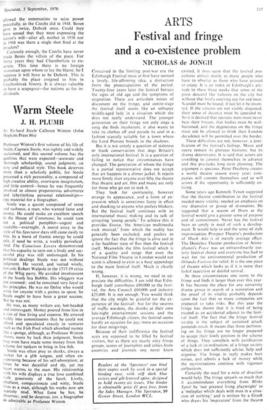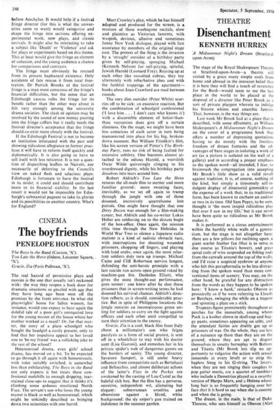ARTS Festival and fringe
and a co-existence problem
NICHOLAS de JONGH
Conceived in the limiting post-war era the Edinburgh Festival must at first have seemed a lovely, life-affirming idea, a distraction from the preoccupations of the period. Twenty-four years later the festival betrays the signs of old age and the symptoms of stagnation. There are articulate noises of discontent on the fringe, and centre-stage the festival itself seems like an unhappy middle-aged lady in a situation which she does not really understand. The younger generation on their fringe not only sings a song she finds incoherent, it also wants to take its clothes off and parade its soul in a.. fashion scarcely suitable for a town where the Lord Provost broods in the shadows.
But it is not simply a question of staleness or frank conservatism that dogs Britain's only international festival. It is a question of failing to notice that circumstances have changed. The generation of whom the fringe is a partial representative does not accept that art happens in a dinnerjacket. It rejects more firmly than anyone over fifty the theory that theatre and art, film and music are only for those who go out to seek it.
They look for spontaneity, however strange its appearance, and a form of ex- pression which is sometimes fuzzy in effect and shocking to anyone who prefers blinkers. But the festival itself continues with its international music making and its talk of attracting 'young people.' To achieve this it provides Stomp, 'the American multimedia rock musical,' from which the nudity has generally been excluded; and prefers to ignore the fact that the fringe is alive and in a far healthier state of flux than the festival itself. Meanwhile the film festival which is of a quality and range that even the National Film Theatre in London would not scorn is allowed to exist as a busy appendage to the main festival itself. Much is clearly wrong.
If, however, it is wrong, we need to ap- preciate the difficulties. I am told that Edin- burgh itself contributes 00,000 to the festi- val, the Arts Council £60,000 and industry £23,000. It is not enough. You would think that the city might be grateful for the ex- perience of the festival: but for the swarms of traffic wardens, the drunks at their own late-night entertainment sessions and the average Edinburgh citizen, the festival seems hardly an occasion for joy; more an occasion for dour misgivings.
Because of their indifference the festival seats are supposed to be filled by festival visitors, but as there are nearly sixty fringe groups, scores of journalists and critics from countries and journals one never knew existed, it does seem that the festival pro- cedures attract nearly as many people who have to observe as those who have arrived to enjoy. It is an index of Edinburgh's atti- tude to these three weeks that some of the press descend like vultures on the city but without that bird's unerring eye for red meat. Scandal must he found; if not let it be inven- ted. If the citizens are not visibly disgusted, their sense of decency must be appealed to. So it is decreed that operatic nuns must never bear their breasts, that bodies must be well- buttoned; and the degenerates on the fringe must not be allowed to think their London decadence will be permitted over the border.
These difficulties are not, however, a justi- fication of the festival's failings. Music and opera remain its glorious bastions; but its drama deteriorates. It is said that actors are unwilling to commit themselves in advance and this precludes long term planning. The argument is specious. Peter Daubeny creates a world theatre season every year; com- panies will commit themselves and so will actors if the opportunity is sufficiently en- ticing.
Some years ago Kenneth Tynan suggested that the theatre contribution to the festival needed more vitality, needed an emphasis on one dramatist or group of dramatists. He suggested that a season of Ibsen at the festival would give a greater sense of purpose and of commitment. Never has the festival been so sorely in need of such a develop- ment. It would help to end the sense of stale improvisation. Prospect Theatre's production of Much Ado is of merely average effect. The Deutches Theater production of Aristo- phanes's Peace was an extraordinarily eso- teric festival choice and everyone has had to wait for the environmental production of Orlando Furioco for relief. It is the one piece of theatre which looks as if it is more than faded repetition or dutiful revival.
In these circumstances one turns to the fringe and finds it larger than ever this year. It has become the place for any university drama group in search of a reputation and the proof of its vitality probably depends upon the fact that so many companies are prepared to take risks. But this year the fringe has shown that it is tired of being treated as an accidental adjunct to the festi- val itself. The fact that the fringe festival society is the subject of sustained attack portends much. It means that those perform- ing on the fringe are no longer prepared to accept their lowly position in the scheme of things. They complain with justification of a lack of co-ordination, of a fringe society which does not sufficiently advise, help and organise. The fringe in reply makes hurt noises, and admits a lack of money while the recriminations continue with vigorous enthusiasm.
Certainly the need for a mite of direction would help. The fringe sprawls so much that it accommodates everything from Blithe Spirit by 'our greatest living playwright' to a Meloplay which deals with man in a situa- tion of nothing.' and is written by a Greek who draws his 'inspiration' from the theatre
before Aeschylus. It would help if a festival fringe director (for this is what the univer- sities seem to want) would categorise and shape the fringe into sections offering ex- perimental work, new plays, and classic revivals. It might also be interesting to take a subject like 'Death' or 'Violence' and ask for plays or experiments based on this theme. This at least would give the fringe an element of cohesion, and the young audience a chance for comparisons and contrasts.
The fringe must obviously be rescued from its present haphazard existence. Only accidents of fate rescue it from total frus- tration. Dr Patrick Brooks of the festival fringe is a man most conscious of the fringe's financial difficulties, but the sense that an Edinburgh caucus rules the fringe for its benefit rather than the other way about is felt very strongly among the university drama societies. The clash of opinion may be resolved by the sound of new money pouring into the fringe coffers but it really needs the festival director's acceptance that the fringe should co-exist more closely with the festival.
If the Edinburgh Festival is not to become an institution infatuated with the past and showing ridiculous allegiance to former prac- tices it will have to reform itself quickly and diplomatically. It is also going to have to sell itself with less reticence. It is not a ques- tion of dispatching leaflets to Nairobi, nor necessarily of deferring to the Council's view on naked flesh and salacious plays. Edinburgh is fortunate to have the festival in its midst; it could and should contribute more to its financial stability. In the last resort it would not be impossible for Edin- burgh's substantial pageant to take its glories and its possibilities to another country. Who's for England?































 Previous page
Previous page